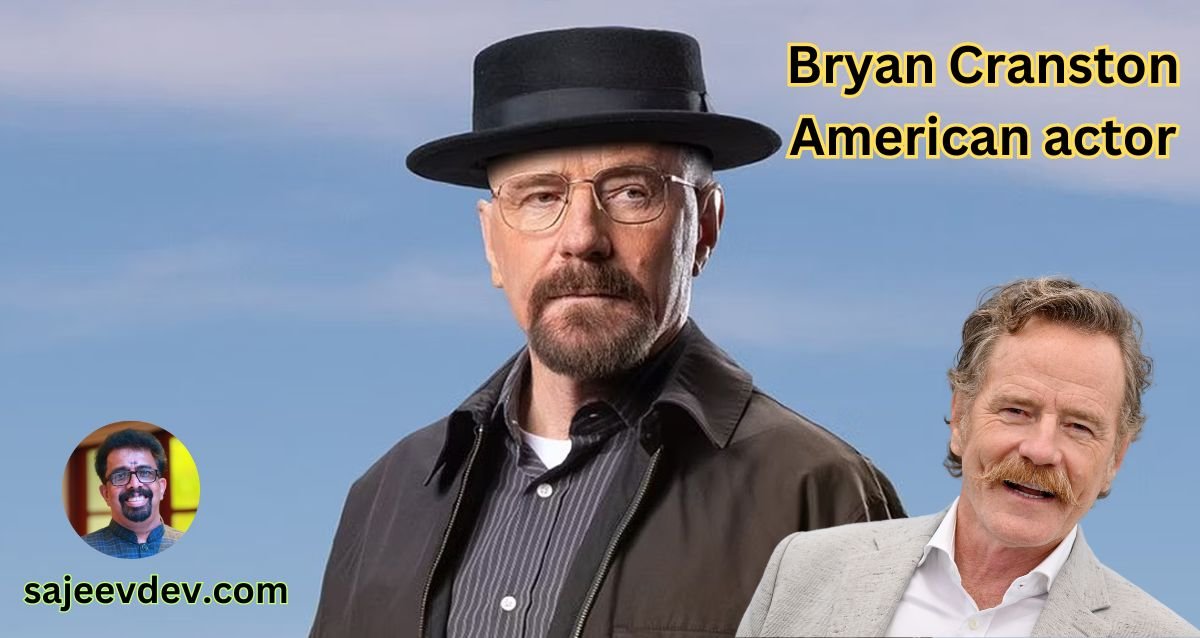Humble Beginnings of Bryan Lee Cranston
Bryan Lee Cranston, born on March 7, 1956, in Hollywood, California, embarked on his life’s journey far removed from the glamour of Tinseltown. Raised by parents with their own dreams of Hollywood stardom—his father was an aspiring actor and his mother an actress—Cranston’s early years were marked by a blend of ambition and reality. His parents’ eventual struggles in the industry provided a stark backdrop to his formative years.
Before finding his footing in the acting world, Cranston took on a variety of jobs to make ends meet. One of his most notable early roles was far from the silver screen: he worked as a waiter, a common fate for many aspiring actors waiting for their breakthrough. This humble beginning provided Cranston with a strong work ethic and a gritty determination that would fuel his future success.
Cranston’s educational path was as diverse as his early employment. He attended Los Angeles Valley College, where he initially pursued a degree in police science. However, a taste of the dramatic arts during an elective course ignited a passion that would eventually overtake all other aspirations. His experience in amateur theater productions and local plays laid the groundwork for his eventual rise in the entertainment industry.
Despite these humble beginnings, Bryan Cranston’s relentless perseverance and inherent talent stood out. His early struggles, filled with odd jobs and perseverance, illustrate a journey of persistence that eventually led him to the pinnacle of international stardom. The transition from waiting tables to capturing hearts on global television screens underscores the remarkable trajectory of Bryan Cranston’s career.
Breaking Through: The Role of Hal in Malcolm in the Middle
Bryan Cranston’s ascent to international stardom owes much to his role as Hal in the popular FOX sitcom Malcolm in the Middle (2000–2006). Hal, the endearing and eccentric father of the family, was a character that allowed Cranston to demonstrate his remarkable range and comedic timing. Despite being a newcomer in the mainstream TV comedy landscape, Cranston’s performance quickly garnered critical acclaim, earning him three Primetime Emmy nominations for Outstanding Supporting Actor in a Comedy Series.
Cranston’s portrayal of Hal broke away from the conventional father figure often seen in sitcoms. Instead of being an authority figure, Hal was relatable, often just as chaotic and clueless as his children. This nuanced portrayal allowed Cranston to infuse authenticity into the role, transforming what could have been a simplistic caricature into a multi-dimensional character. Through Hal, Cranston showcased his ability to balance humor with genuine heartfelt moments, demonstrating his dramatic range even in a comedic context.
The success of Malcolm in the Middle served as a critical turning point in Cranston’s career. Hal’s character not only solidified Cranston’s status as a versatile actor capable of leading a successful television series but also opened doors for him to explore more complex roles in the future. This role laid the groundwork for his later iconic portrayal of Walter White in Breaking Bad, where his dramatic prowess would secure him an indelible place in television history.
Ultimately, Bryan Cranston’s role as Hal was a linchpin in his career, bridging his early years of television appearances and commercials to the heights of critical and commercial acclaim. His work in Malcolm in the Middle stands as a testament to his ability to illuminate the human experience, even within the confines of a sitcom, and set the stage for his continued success in the entertainment industry.
Transformative Performance: Walter White in Breaking Bad
Bryan Cranston’s portrayal of Walter White in AMC’s ‘Breaking Bad’ (2008-2013) stands as one of the most riveting performances in television history. His character, a high school chemistry teacher turned methamphetamine manufacturer, represents a deep dive into the complexities of human nature, showcasing the gradual transformation from a benign educator to a formidable drug lord. For his extraordinary characterization of Walter White, Cranston was awarded four Primetime Emmy Awards for Outstanding Lead Actor in a Drama Series, and a Golden Globe in 2014.
Cranston’s embodiment of Walter White was multifaceted and deeply immersive. His ability to capture the nuanced descent of his character from an everyday man overwhelmed by life’s challenges to a volatile, power-driven figure was both compelling and chilling. Each episode revealed another layer to Walter White, and Cranston’s performance brought a visceral authenticity that resonated strongly with audiences and critics alike. The character’s evolution was meticulously crafted, owing much to Cranston’s commitment and his understanding of the role’s depth.
The cultural impact of ‘Breaking Bad’ extends far beyond its initial run, largely due to Cranston’s masterful performance. The series became a critical darling, amassing a dedicated fan base and spawning countless discussions on morality, consequence, and identity. Walter White’s iconic lines and memorable scenes continue to permeate popular culture, attesting to the show’s lasting influence. The character of Walter White, thanks to Cranston’s powerful portrayal, remains a touchstone in television acting—a benchmark against which other performances are often measured.
Overall, Cranston’s role in ‘Breaking Bad’ not only cemented his place in television history but also demonstrated the potential of television as a medium for intense, character-driven storytelling. His portrayal of Walter White is an exemplar of how a role, when executed with precision and passion, can transcend the screen and leave an indelible mark on its audience.
Branching Out: Producer and Director Roles
In 2011, Bryan Cranston took on the role of producer for the critically acclaimed television series ‘Breaking Bad.’ This significant career move not only allowed him to broaden his influence within the industry but also garnered him two awards for Outstanding Drama Series. Cranston’s involvement behind the scenes showcased his ability to excel beyond acting, contributing deeply to the creative process and overall success of the series.
Cranston’s expansion into producing and directing demonstrated his versatile talent and comprehensive understanding of the entertainment industry. As a producer, he was instrumental in shaping ‘Breaking Bad’ into the phenomenon it became, illustrating his knack for storytelling and narrative development. This transition from actor to producer provided him with a new platform to imprint his creative vision, making him an indispensable part of the show’s legacy.
In addition to ‘Breaking Bad,’ Cranston co-developed the TV series ‘Sneaky Pete’ which aired from 2015 to 2019. This show marked another step in his evolving career, highlighting his ability to juggle multiple roles effectively. As a co-developer, Cranston had substantial input in the series’ direction and storyline, reflecting his expanding role in the industry. Additionally, his occasional appearances in the series as an actor kept him connected to his roots, bridging his achievements in acting with his accomplishments behind the camera.
Cranston’s foray into producing and directing has significantly amplified his impact on the entertainment world. By embracing these roles, he has been able to influence the industry on a larger scale, contributing to the creation of compelling content and enriching the viewer’s experience. His career trajectory serves as an exemplary model of growth and diversification within the entertainment sector, underscoring the value of multifaceted skill sets in achieving enduring success.
Stage Success: Triumphs on Broadway and the West End
Bryan Cranston has proven that his talent extends far beyond the screen. His remarkable stage career has earned him critical acclaim and several prestigious awards. In 2014, Cranston captivated audiences on Broadway with his performance as President Lyndon B. Johnson in the play ‘All the Way.’ His portrayal of the dynamic and controversial president was lauded for its depth, intensity, and authenticity. This stellar performance earned him the Tony Award for Best Actor in a Play, solidifying his status as a consummate performer. Cranston’s success on the stage continued as he reprised his role as Lyndon B. Johnson in the HBO film adaptation of ‘All the Way.’
In addition to his success with ‘All the Way,’ Cranston took on the challenging role of Howard Beale in the stage adaptation of the iconic film ‘Network.’ His portrayal of the mentally unstable news anchor who famously declares, “I’m as mad as hell, and I’m not going to take this anymore!” resonated deeply with both audiences and critics. This performance earned him the Laurence Olivier Award when the production debuted in London’s West End, reaffirming his exceptional talent in the realm of theater. Later, when ‘Network’ transferred to Broadway, Cranston continued to receive accolades, including a second Tony Award. This consecutive acknowledgment further attests to his remarkable ability to master prominent and demanding roles in live theater.
Cranston’s achievements on Broadway and the West End highlight his versatility as an actor. His transition from television and film to the stage showcases a breadth of skill that is rare in the performing arts. Each role he undertakes allows him to explore different facets of his craft, making him a remarkable figure in both American and international theater. With his dedication to authenticity and excellence, Bryan Cranston continues to leave a lasting impact on every stage he graces.
Silver Screen Endeavors: Memorable Film Roles
Bryan Cranston’s foray into the film industry has been marked by a series of impressive and diverse roles, showcasing his extraordinary range as an actor. His journey on the silver screen began with a notable appearance in Steven Spielberg’s war epic, Saving Private Ryan (1998), where he portrayed War Department Colonel I.W. Bryce. While his role was brief, it laid the groundwork for future opportunities in the film domain.
In 2006, Cranston delivered a memorable performance in the critically acclaimed ensemble comedy-drama, Little Miss Sunshine. Here, he played the antagonistic corporate executive Stan Grossman. The film’s widespread success and Cranston’s strong supporting role further cemented his status as a versatile actor capable of contributing significantly to both film and television.
Continuing his streak of versatile roles, Cranston starred in the 2011 neo-noir crime drama Drive, directed by Nicolas Winding Refn. His portrayal of Shannon, a mechanic and mentor to the protagonist, added a layer of emotional complexity to the film. Cranston’s ability to delve into multifaceted characters was on full display, earning him praise from critics and audiences alike.
The year 2012 saw Cranston take on a substantial role in Ben Affleck’s historical thriller Argo, based on a true story. Playing CIA agent Jack O’Donnell, Cranston once again demonstrated his impeccable talent for capturing intense, dramatic narratives. The film’s critical and commercial success, winning the Academy Award for Best Picture, was a testament to the solid performances delivered by its cast, including Cranston.
Perhaps the pinnacle of Cranston’s film career came with his portrayal of Dalton Trumbo in the 2015 biographical drama Trumbo. His exceptional performance as the blacklisted Hollywood screenwriter earned him an Academy Award nomination for Best Actor. Cranston’s meticulous embodiment of Trumbo’s intricate persona — marked by resilience, wit, and vulnerability — was widely lauded, highlighting his ability to tackle complex historical figures with nuanced depth.
Bryan Cranston’s contributions to the film industry are distinguished by his relentless pursuit of challenging and diverse roles. Each performance, whether in a supporting or leading capacity, underscores his compelling presence on the silver screen. His journey from television to film stands as a testament to his remarkable talent and adaptability as an actor.
A Voice to Remember: Animation and Voice Acting
Bryan Cranston’s exceptional voice acting has only furthered his reputation as a versatile performer. One of his notable voice acting roles was in ‘Madagascar 3: Europe’s Most Wanted’ (2012), where he brought depth and charm to the character of Vitaly, a grumpy Russian tiger. Cranston’s ability to infuse unique personality traits into the character made Vitaly memorable amongst the vibrant cast of the animated series.
In 2016, Cranston lent his voice to another significant role as Li Shan, Po’s long-lost biological father, in ‘Kung Fu Panda 3’. His performance was both heartfelt and humorous, as he brought to life the complexities of a father-son reunion with grace and wit. Cranston’s warm and fatherly voice paired with the film’s vivid animation created a uniquely touching character that resonated with audiences of all ages.
Cranston continued to showcase his voice acting prowess in Wes Anderson’s ‘Isle of Dogs’ (2018). Taking on the role of Chief, a rough-and-tumble stray dog, Cranston masterfully conveyed a balance of gruff exterior and underlying compassion. His performance added considerable depth to the film, contributing to its critical acclaim. Cranston’s vocal versatility and ability to evoke emotion purely through voice were pivotal in the film’s success.
Looking ahead, Bryan Cranston is set to reprise his role as Li Shan in the eagerly anticipated ‘Kung Fu Panda 4’ (2024). Fans are excited to see (or hear) Cranston bring back the cherished character, anticipating another stellar performance that combines humour, emotion, and undeniable talent. Cranston’s contributions to the world of animation underscore his remarkable range as an actor and his ability to captivate audiences across different mediums.
Personal Reflections and Future Endeavors
Bryan Cranston’s journey from waiting tables to international stardom is nothing short of inspirational. Reflecting on his early days, Cranston has often spoken about the tenacious spirit that propelled him through the uncertain periods of his career. He emphasizes the importance of perseverance and resilience, offering a personal philosophy that success comes to those who persist, even when the odds seem insurmountable.
Cranston’s working style is a testament to his dedication and commitment to his craft. Known for his meticulous preparation and unyielding focus, he attributes much of his success to a disciplined approach to acting. He genuinely believes in the mantra, ‘work hard, play hard,’ balancing intense periods of professional endeavor with moments of personal relaxation and joy. His dedication is evident in the diverse roles he has undertaken, from the iconic Walter White in “Breaking Bad” to his Broadway performances, showcasing remarkable versatility and depth.
Looking ahead, Bryan Cranston remains an active and influential figure in the entertainment industry. He is passionate about exploring new creative avenues, with projects that continue to challenge and redefine his capabilities as an actor. Amongst his anticipated endeavors are several ambitious film and television projects, as well as potential returns to the stage, where his theatrical roots continue to inspire him. Cranston’s upcoming ventures promise to build on his already impressive legacy, further cementing his status as a powerhouse of talent.
Through his journey, Bryan Cranston exemplifies the profound impact of hard work and determination. His story serves as a beacon of motivation for aspiring talents across the globe, illustrating that with persistence and unwavering dedication, one can transform dreams into reality. Cranston’s example reminds us that the path to success is not without its challenges, but overcoming these hurdles can lead to extraordinary achievements and enduring inspiration.









